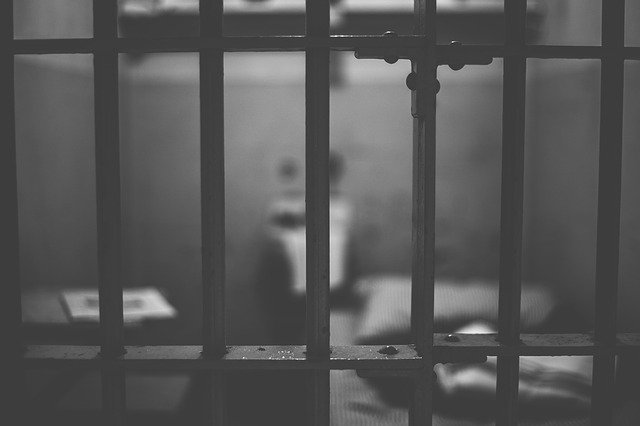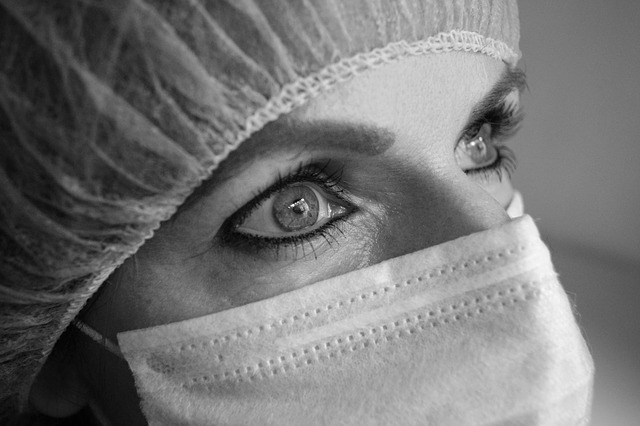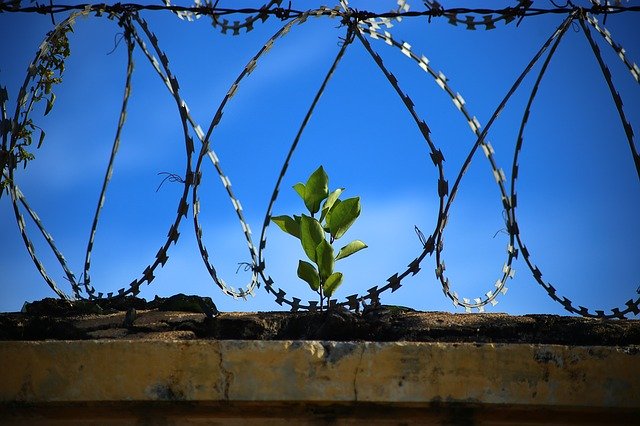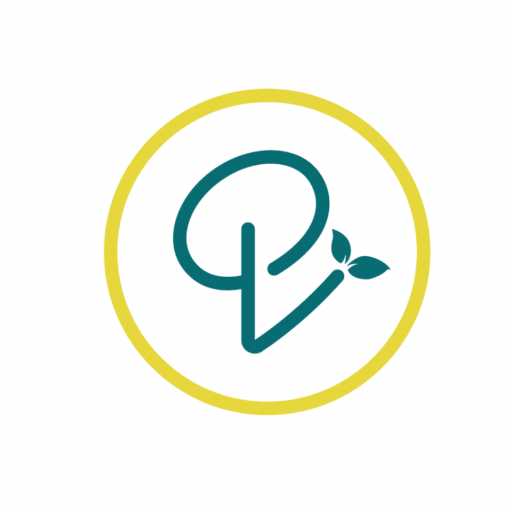French Prison Garden
Bienvenue à nouveau sur Plus de vert less béton ! Si c'est la 1ère fois que tu viens ici, sache que je mets à ta disposition un bonus entièrement gratuit qui t'explique "comment créer un jardin thérapeutique à moindre coût" clique ici pour télécharger le bonus gratuitement ! 🙂
Bienvenue à nouveau sur Plus de vert less béton ! Si c'est la 1ère fois que tu viens ici, sache que je mets à ta disposition un bonus entièrement gratuit qui t'explique "comment créer un jardin thérapeutique à moindre coût" clique ici pour télécharger le bonus ! 🙂
A first article about the prison garden and the health needs of prisoners is being written today.
What is the pulse in French prisons today?
Does Nature have a role to play in the prison world?
Can we talk about care garden, therapeutic garden in prison?
Are there health needs that could be alleviated by the garden in prison?
I would like to thank Céline Barrault, a doctor at the Tours prison since 2007, for taking the time to answer my questions. Her return, allows this article to be closer to the reality of the field and more alive. I hope that you will appreciate his return, as I do, without any fancy talk. Thank you, Celine, for your authenticity.

Some numbers
According to the Ministry of Justice, the number of persons imprisoned in France in January 2020 was 82,860.
70,651 of these persons are detained:
about 2/3 of those convicted (49,576)
1/3 of defendants (21,075).
1% are minors
3.8% are women
There are 187 penitentiary institutions for which :
4 institutions or wards with a density greater than or equal to 200%.
43 establishments or neighbourhoods with a density greater than or equal to 150 and less than 200%.
53 establishments or neighbourhoods with a density greater than or equal to 120 and less than 150%.
For example, the Tours remand prison, which has 140 places, currently accommodates 300 people, more than double its capacity.
Despite the 9.06 billion euros spent in 2019, the number of detainees sleeping with a mattress on the floor continues to increase:
+ 16.2% increase between the beginning of 2019 and 2020.
Glossary of institutions
Like any institution, it is difficult to approach a subject, a universe of any kind, without coming up against a specific vocabulary, lexical field and abbreviations.
In order to make things clearer, here are some explanations of the different institutions, specific to the prison world. To know the basic vocabulary of those with whom we are or would be brought into contact is, in my opinion, a minimum. Just as it would not occur to anyone to become an orthopedic surgeon or physiotherapist without knowing the scientific names of each bone of the body, in addition to their role and functioning.
Here are therefore very briefly some points of reference that will allow you to make the difference between the different penitentiary establishments that we find in France :
The house of arrest = MA
The remand home welcomes:
- remand prisoners (i.e. not yet tried)
- of prisoners sentenced to less than two years’ imprisonment
- convicted prisoners whose sentence ends in less than two years (e.g. ends of long sentences that are close to home)
- convicted prisoners awaiting transfer to « prisons for punishment » (i.e. detention centre = CD or central)
The detention center = CD
Also known as the Central, the detention centre houses :
- prisoners sentenced to more than two years who are said to be « re-insertable », i.e. « not too dangerous ».
- of prisoners, sentenced to long terms
- inmates considered dangerous and/or with little capacity to be in a reintegration process.
The penitentiary centre
Penitentiary centers:
- are prisons where several systems coexist.
For example: part prison and part detention centre. - The inmates are not supposed to cross each other. For this purpose they are often different buildings, grouped in the same geographical area.
Rights to health
For Celine, there is no photo. Each inmate is welcomed and taken care of as she would during a « classic » consultation outside.
« I take the time, I talk to the patients, I examine them, sometimes I pull up their suspenders, I put them in a room, in short, I do normal consultations, to normal people. »
Prisoners also enjoy the same rights to health as any other person, including the individual:
- has the right to access his medical records. Like any other patient, he must follow the standard procedure by making a request to the hospital’s quality department. The cost of the copies remains his responsibility, as for any patient, here again. If the prison administration, the Judge, the Prosecutor, want information necessary for an investigation, the file can be seized as in an ordinary service of the CHRU, within a very strict framework.
- can benefit from a consultation with the doctor after a simple request from him. The detainee makes a written request, which he deposits in a box designed for this purpose and has an appointment generally within 24 hours, excluding weekends.
- can benefit from consultations with specialists. In this case the waiting time is often longer, but here again nothing very different from what one can experience as a free patient.
- on release or transfer, the copy of all the tests that were carried out during the detention are given to the detainee (blood test results, x-ray, consultation report…)
Specificities of the prison care pathway
There are, however, some specificities in the care pathway of each prisoner.
Upon arrival in detention, the detainee :
- is received in an entrance consultation: the history, current health problems, current treatment and treatment to be continued are listed.
- a review of the immunization status is made and an update is proposed
- an entry balance sheet is also proposed. This varies according to the age, history and health risks most regularly found among inmates. For the youngest: a sexually transmitted disease (HBV HCV HIV) check-up. For the oldest, can be added a lipid-carbohydrate test, or a liver test if there is a notion of alcohol consumption. For the oldest inmates, a PSA (prostate specific antigen) test may be offered again.
- A tuberculosis screening is done with the realization of a pulmonary X-ray. Practices requested by the Ministries, due to the promiscuity of people in detention facilities.
On leaving detention :
- a discharge consultation is scheduled to refer to a city doctor, make sure the patient leaves with his prescription, discharge letter, papers…
In between, the team:
- handles emergencies when they happen.
responds to the various health needs of inmates (including the distribution of treatment) - participates in health prevention, informs about risks
- schedules outpatient consultations as needed
- organises administrative consultations in order to help detainees with certain procedures, such as applications for ALD (long-term illness) or MDPH (disability related assistance).
Composition of the health care team
First of all, when I questioned our doctor, Celine, she wanted to point out one thing:
« All the health professionals who come to the prison do so voluntarily, that is to say that we agreed to come, that we were motivated to be there. Moreover, the turnover is slow, the new nurses who arrived in the last two years have replaced nurses who had retired. Most of my colleagues have been here for several years.
Basically, we’re not here out of punishment, we’re here out of conviction. »
Interesting point of view to read because it breaks the stereotypical image that one might have seen from the outside. It remains a unique point of view, in a prison, you might say. It could be said that this may not be true for all prison workers! I agree, but it does, however, open up some optimistic prospects with regard to the often very negative view of work in prison and gives us hope that this is indeed the case for the majority of people who work with prisoners.
Returning to the composition of the health care team :
It’s the health unit (SHU) that provides care on a daily basis. Doctors and paramedics do not depend on the prison administration, but on the hospital, as was intended by the 1994 reform. The medical unit can be attached to either a psychiatric or emergency unit.
In prison, the presence of an H24 doctor is not an obligation, only the continuity of care must be guaranteed. Therefore, on weekends and evenings, it is SOS doctor who, under agreement with the Hospital Center, takes over in case of need.
The team of the Tours prison, for example, is composed of :
- general practitioners
- of nurses
- of psychologists
- psychiatric
- a physiotherapist
- a dentist
Female presence

The women are omnipresent at the Tours prison.
For Celine:
« We always think that for some patients, or for some inmates if we stay in the prison world, that taking orders from a woman is going to be problematic. Probably for some, it is the case…
But I have the impression that tensions rise less quickly when patients/inmates have a woman in front of them. I don’t think there’s that testosterone contest you sometimes feel between two men.
I think it is very necessary to have both types of workers : having only women could also put patients in difficulty. Our different approaches to the same patient/prisoner is obviously a strength. It’s a strength in any profession, for that matter. »
Health needs of inmates
According to the Observatoire Français des Drogues et des Toxicomanies (OFDT), people in detention are a vulnerable population in the face of addictions, especially since they often combine with socio-economic difficulties (low level of education, low income, precarious housing, etc.). In a context of chronic overcrowding, living conditions in detention are not conducive to maintaining the health of prisoners and may cause or aggravate certain addiction-related disorders.
Thus in the prevalent elements in health we find :
- infectious diseases and risks
- psychiatric problems
- addictions
- the risk of suicide
- chronic diseases and other health problems related to physical inactivity, diet and hygiene conditions.
Although the problems often have their origins prior to detention, they are exacerbated by the detention itself and the conditions in which it takes place on a daily basis. As I read up on the subject, I saw how each health problem is intertwined.
Identifying health problems is good, but what about their prevention and treatment in detention?
Each prevailing need deserves more attention. Which I will probably do, as the subject is so exciting and the needs are there.
I also note that what is sometimes a problem, can turn out to be a solution (admittedly far from ideal). For example, the high concentration and co-detention that is necessary due to overcrowding would limit the number of suicides in prisons. However, I doubt that we should be satisfied with this state of affairs.
Detention also allows some people to receive initial care for their health problem(s). It is not uncommon for a person to be detained upon arrival:
- no attending physician
- that it’s been a very long time since she’s seen a medical professional…
- or even that it is a first time at all, for example in the case of care for psychiatric problems.
For Céline, our doctor, psychiatric problems are the most aggravated by confinement. According to her, the efforts to be made in terms of health in prisons are not, paradoxically, to be carried out on the medical care side.
The efforts seem to be indispensable according to our doctor:
- on hygiene : showers in the cell, to be able to wash every day…
- on activities
Let us not forget that the purpose of any detention is not only to punish for an illegal act committed, but also, and above all, to make each detainee a « better » person with a view to reintegration into society.
Céline :
« Yes yes yes, they’re in jail, they’ve done some bad things, and you have to pay them activities to distract them… But who can imagine that a guy who’s lying in front of a TV for 22 hours a day can get out of there, better than when he goes in???? Who got better off doing a cable TV cure, really???? »
The means are currently allocated by the ARS (regional health agency).
Céline: « Like everywhere, we would like more: for example:
- more dentist visits, because the needs are huge…
- more physiotherapy sessions, because better management of patients in physiotherapy would mean prescribing fewer painkillers for a better result.
The challenge at the moment is to get additional positions:
1/a pharmacy assistant so that the nurses can be detached from this work and to be able to have a nursing role again (care, prevention, tabaco consultations, dietary consultations, relaxation sessions (yes, yes, they did not do well, we know, but having relaxation sessions is not a comfort, it is a way to manage stress, emotions, and to decrease the treatments or why not? the use of addictions)
2/ a dental assistant so that the dentist can drastically reduce her waiting list and work in safety. »
A prison garden

With this in mind, one might ask:
What benefits could the inmates gain by having access to a garden, accompanied workshops? And above all, what impact could this have on their health ? During and after detention.
Even if it is very badly perceived today to talk about therapeutic gardens in prison (I will come back to this in another article), the fact remains that the garden could really play a role in the care of prisoners in my opinion.
This is what Céline replied to me when I asked her what a garden and workshops in the garden could do for the health and well-being of inmates:
Céline Barrault: « A garden workshop could have a real educational role : gardening is following a protocol, it’s learning patience, it’s respecting a minimum of rules to get results, it’s learning from one’s failures (I know it well, I’m bad at gardening).
To make a vegetable garden is to learn the seasons, to learn how to eat better, to be able to talk about food in a different way (in a less dogmatic, less medical way, less of a pain in the ass, etc.).
Growing a plant, harvesting a fruit or vegetable is a small victory when you’re a novice (the first time I managed to grow a crocus, I was on fire, so it probably doesn’t make a big deal… but it was MY crocus)… and our patients sometimes need victories, even small ones… it puts them back on track.
Besides, there are places where inmates can garden: at least in Réault, where during a visit we came across a small vegetable garden…, there were workshops, it seems to me.
Maybe this kind of workshop is done in prisons for sentences, so that the length of the sentence allows for a complete cycle (from seed to plant), so that it makes sense.«
I purposely left our doctor’s testimony intact. I find the subject totally relevant and its examples have a real resonance in my eyes as a garden consultant. It goes without saying that when we talk about relaxation and stress reduction, that the garden still has all the legitimacy.
In the same way that Céline welcomes detained patients in medical consultation, without any discrimination related to the status of the person, we must keep in mind that before taking care of a detainee, we take in CARE a human being in total loss of landmarks, during sessions in the garden.
Certainly there are still obstacles in the creation and animation of care gardens in France, but perhaps the blockages come more from outside the penitentiary sectors than from inside, finally, don’t you think?
To go further
All references provided are unfortunately all in French.
If you still wish to have access to them, I invite you to have a look here, section : « Pour aller plus loin »
Interact!
As always, I invite you to like and share in public mode the article if you liked it.
This will help to highlight the work accomplished and lead to a common reflection on the subject.
All comments are welcome!
Don’t hesitate to leave yours directly below the article itself, on the page of the site.
Original version in french
Access the original version here : « Jardin en prison française »




Un commentaire
Nico06
really interesting ! Thanks Paule